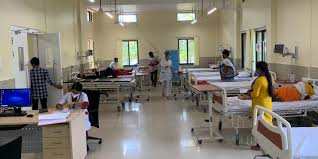Cancer care, closer home.
According to the Indian Council of Medical Research, India had more than 14 lakh cancer patients in 2023. Experts reckon that this figure is very likely an underestimate — the actual disease burden could be 1.5 to 3 times more than the reported cases. Though India has a screening programme for cervical, oral and breast cancers — these constitute more than a third of the country’s cancer burden — detection rates are among the lowest in the world. Late detection of malignancy, and therefore late initiation into treatment, is amongst the biggest public health challenges in the country. The problem is particularly serious in rural areas. That’s why the government’s initiative to equip all district hospitals with a cancer care centre is much-needed. According to a blueprint drawn up by the Union health ministry, every such facility will have an or a medical officer, along with two nurses, a pharmacist and a multi-purpose worker.
The number of cancer specialists required by the country varies according to surveys. However, even by conservative estimates, India is short of at least 2,000 oncologists. Some district centres, especially in the Northeast and Kerala, do offer specialised cancer care. However, at least 50 per cent of oncologists operate from urban centres. Drafting specialists could, therefore, be a challenge for the new programme. For starters, the government could upscale the use of mobile clinics in rural areas. A large section of patients, many of them women, do not come forward for screening. The new initiative could link up with hospitals which send teams to people’s doorsteps and work sites for diagnostic tests. Policymakers should also find ways to encourage the use of digital tools, such as telemedicine, at the new rural cancer units and link them through the National Cancer Grid. This will allow the exchange of expertise between rural and urban facilities.
Cancer treatment can be emotionally taxing and patients in rural areas face additional mental health challenges due to limited support groups. That’s why several patients discontinue therapy. The provision of counseling services at the new centres could help ensure continuity in treatment. This could be complemented with telehealth counseling services to provide mental health support to rural patients. The government would do well to use advancements in technology to mitigate deficits in resources.
